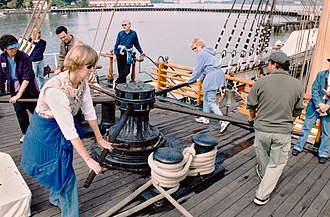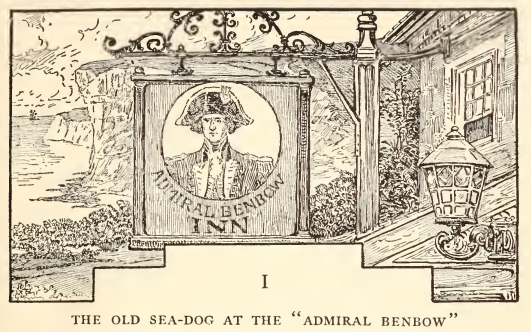※カラフル対訳で紹介している作品はすべてパブリックドメインです。
このサイトで使われている作品のすべては著作権の切れた名作などの全文を電子化して、インターネット上で公開しているProject Gutenberg(プロジェクト・グーテンベルク)、LibriVox(リブリヴォックス、朗読図書館)の作品を出典としています。
翻訳者:中務秀典
名作『宝島』で英語が楽しく学べる!
SQUIRE TRELAWNEY, Dr. Livesey, and the rest [残り] of these gentlemen having asked me to write down the whole particulars[詳細, 顛末] about Treasure Island,
大地主のトレローニーさんや医者のリバシーさん、その他のみんなが、宝島に関するすべてを書き記すようにと僕に頼んだんだ。
from the beginning to the end,keeping nothing back but the bearings of the island,
島の方位・方角以外の始めから終わりまでなにもかも包み隠さず、
and that only because there is still treasure not yet lifted,[持ち上げる]
ただまだ掘り出されていない宝もあるから(方位だけは明かさないでと言われている)
I take up my pen in the year of grace 17__ and go back to the time
僕はペンをとって、いまは、西暦17__年だけど、時をさかのぼってみることにする。
when my father kept the Admiral Benbow inn and the brown old seaman with the sabre[saber] cut first took up his lodging under our roof.
僕の父がベンボウ提督亭っていう宿屋を経営していたある日、刀傷があって日焼けした老いた船乗りが、初めて私たちの宿に泊まった時までさかのぼることとしよう。
I remember him as if it were yesterday, as he came plodding[とぼとぼ歩く] to the inn door,
その男のことは、まるで昨日のことのようによく覚えている。宿の入口までとぼとぼと足重にやってきて、
his sea-chest following[後に続く] behind him in a hand-barrow
後ろに船乗りの衣装箱を手押し車で運ばせていた。
–a tall, strong, heavy, nut-brown man, his tarry pigtail falling over the shoulder of his soiled blue coat,
背が高く、力強くがっしりと逞しく、栗色の褐色肌の男で、タールまみれの弁髪が汚れた青い上着の肩に垂れ下がっていた。
his hands ragged and scarred, with black, broken nails, and the sabre cut across one cheek, a dirty, livid[鉛色の] white.
両手はぼろぼろで傷んでいて、黒ずみ、爪は割れていて、片方のほおには汚ない青白い刀傷が走っていた。
I remember him looking round the cove and whistling to himself as he did so,
私は覚えている。やつは小さな入り江を見回しながら口笛を吹き、そうしているうちに
and then breaking out[急に~しだす] in that old sea-song that he sang so often afterwards:
後にやつがしょっちゅう歌うことになる、あの古い船乗りの歌を突然歌い始めたんだ。
“Fifteen men on the dead man’s chest– Yo-ho-ho, and a bottle of rum!”
「死んだ男の衣装箱に15人の男が…ヨーホー!ヨーホー!ヨーホー! ラム酒が1本!」
in the high, old tottering voice that seemed to have been tuned and broken at the capstan bars.
甲高く、年老いてよたついた声は、キャプスタン の棒で(ロープをまきあげるときに)声を張りあげて枯らしてしまったものだと思う。
の棒で(ロープをまきあげるときに)声を張りあげて枯らしてしまったものだと思う。
Then he rapped on the door with a bit of stick like a handspike that he carried,
それから、やつは手に持っていた梃子棒みたいなちょっとした棒でドアを叩いて、
and when my father appeared, called[大声で呼ぶ] roughly for a glass of rum.
僕の父が姿を見せると、ラム酒を一杯くれと乱暴に言い放ったものだ。
This, when it was brought to him, he drank slowly, like a connoisseur,[鑑定家, 目きき]
ラム酒が運ばれると、玄人みたいにちびりちびりとやって、
lingering[長引く, ぐずぐずする] on the taste and still looking about him at the cliffs and up at our signboard.
じっくりと味わいながら、静かに辺りの崖の方を眺めたりしていたけど、宿の看板を見上げて、
“This is a handy cove,” says he at length; “and a pleasant sittyated[situated] grog-shop.
「手ごろな入り江だな」とようやく口を開き、「それになかなか場所もいい飲み屋じゃねぇか」
Much company, mate?” My father told him no, very little company, the more was the pity. [不幸なことに]
「客は多いのかい?おい」 父は、いいえ 客はほんの少しだけですよ、残念ながらね。とやつに答えてた。
“Well, then,” said he, “this is the berth for me.
「そうかい、じゃ、ここが俺の停泊所だな」
Here you, matey,” he cried to the man who trundled the barrow; “bring up alongside[そばに, 横付けに] and help up my chest.
「こっちにこい、おい」と、やつは手押し車をごろごろと押してきた男に怒鳴りつけた。「こっちに持ってきて、箱を上に運び上げるのを手伝いな。
I’ll stay here a bit, he continued.”
しばらくここにいることにするぜ」とやつは続けた。
I’m a plain man; rum and bacon and eggs is what I want, and that head up there for to watch ships off.
「俺は、質素な(男)ものさ。ラムとベーコンエッグさえありゃいいんだ。それから、船の出航を見張るからあっちの方に向いていればな。
What you mought call me? You mought call me captain.
俺をなんと呼べばいいかだって?キャプテンと呼ぶんだな。
Oh, I see what you’re at[what you’re getting at]— there; and he threw down three or four gold pieces on the threshold.
おっと、言いたいことはわかってるさ」と、戸口に金貨を3、4枚投げると、
You can tell me when I’ve worked through that, says he, looking as fierce[獰猛な] as a commander.
「(俺がそれを)使い切ったら、言うがいい」と、司令官のような厳しい顔つきで言った。
And indeed bad as his clothes were and coarsely[粗雑に, 下品に] as he spoke,
実際、やつの服はひどいもので、言葉使いも粗野だったが、
he had none of the appearance[風貌・見かけ] of a man who sailed before the mast,
ただの平水夫[水夫は前檣(しよう)の前の船首楼に居住した]だった風体にはまったく見えず、
but seemed like a mate or skipper accustomed to be obeyed or to strike.
命令に従わせたり、殴ることに慣れている航海士や船長といった風だった。
The man who came with the barrow told us the mail had set him down the morning before at the Royal George,
手押し車を押してきた男が言うには、朝、ロイヤル・ジョージの前で郵便馬車がやつを降ろすと、
that he had inquired what inns there were along the coast, and hearing ours well spoken of,
この海岸沿いにどんな宿があるかを尋ね、うちの宿の評判がいいことを聞き、
I suppose, and described as lonely, had chosen it from the others for his place of residence.[居住地]
たぶん、ぽつんと一軒離れたところにあると説明されて、数あるなかからやつの宿として選んだというわけらしい。
And that was all we could learn of our guest.
それがあの客について知り得たすべてだった。
He was a very silent man by custom. [個人的習慣]
やつは普段はとても無口だった。
All day he hung round the cove or upon the cliffs with a brass telescope;
昼は一日中、真鍮製の望遠鏡をもって、入り江の周辺や崖上をぶらぶらとうろつき、
all evening he sat in a corner of the parlour next the fire and drank rum and water very strong.
夜は一晩中、暖炉の近くの食堂の隅に座り、とても強いラムの水割りを飲んでいた。
Mostly he would not speak when spoken to, only look up sudden and fierce and blow through his nose like a fog-horn;
たいてい誰かに話しかけられても口をきかず、ただ急に獰猛な顔つきで見上げて、霧笛のように鼻をならすばかりだった。
and we and the people who came about our house soon learned to let him be.
まもなく、僕たちや家にやってくる人たちは、やつには好きなようにさせておくのが良いと学んだ。
Every day when he came back from his stroll he would ask if any seafaring men had gone by along the road.
毎日散歩からかえってくると、やつは船乗りたちが道を沿って通ったかと尋ねたものだった。
At first we thought it was the want of company of his own kind[同種の] that made him ask this question,
最初はみんな、そんなことを聞くのは、自分と似た仲間がほしいからだと思っていたが、
but at last[最後には] we began to see he was desirous[望んでいる] to avoid them.
そのうち、船乗りを避けたがっていることがわかってきた。
When a seaman did put up at the Admiral Benbow (as now and then some did, making by the coast road for Bristol)
ベンボウ提督亭に泊まる船乗りがいると、(時々、海岸沿いの道を通ってブリストルへ向かう者が何人かいた)
he would look in at him through the curtained door before he entered the parlour;
やつは食堂に入る前にカーテンのかかったドアからその船乗りを覗き込み、
and he was always sure to be as silent as a mouse when any such was present.[人が居合わせた]
そしてそんな客がいたときには、いつも必ずねずみみたいにおとなしくしていたものだ。
For me, at least, there was no secret about the matter, for I was, in a way, a sharer in his alarms.
少なくとも僕にとっては、そのことはまったく秘密ではなかった。というのも僕はある意味で、やつの恐怖の共有者のようなものだったから。
He had taken me aside one day and promised me a silver fourpenny on the first of every month
ある日やつは僕をわきに呼んで、毎月のはじめに4ペニー銀貨をくれる約束をした。
if I would only keep my “weather-eye open[予期される危険などに対して絶えず気を配っている] for a seafaring man with one leg” and let him know the moment he appeared.
もし僕が「片足の船乗りをしっかりと見張って」、そいつがあらわれたらやつにすぐに知らせれば。
Often enough when the first of the month came round[~がやってきて] and I applied[申請する] to him for my wage, [賃金]
たいていの場合、月のはじめになって、報酬をもらいにやつのところにいくと、
he would only blow through[息を吹きかける, 鼻をかむ] his nose at me and stare me down,[見つめることで躊躇わせる]
僕に向かって鼻をならして睨みつけるだけだった。
but before the week was out he was sure to think better of it,
でも一週間もしないうちに必ず考え直し、
bring me my four-penny piece, and repeat his orders to look out for “the seafaring man with one leg.”
4ペニー銀貨をもってくると、『片足の船乗り』を見張るんだと繰り返した。
How that personage[人物] haunted my dreams, I need scarcely tell you.
その男がどれほど僕の夢に憑りついて出てきたかは、ほとんど言うまでもないだろう。
On stormy nights, when the wind shook the four corners of the house and the surf roared along the cove and up the cliffs,
嵐の夜、風が家の四隅を揺らし、波が入り江に沿って、崖の上までとどろくとき、
I would see him in a thousand forms, and with a thousand diabolical[極悪非道の] expressions.
僕には片足の男が千変万化に姿をかえ、千変万化の悪魔のような表情をしているように見えたのだ。
Now the leg would be cut off at the knee, now at the hip; now he was a monstrous kind of a creature
足がひざのところで切れているときもあれば、腰のところから切れているときもあり、怪物のような生き物になることもあって、
who had never had but the one leg, and that in the middle of his body.
そいつは生まれつき足が一本しかなく、そしてその足は体の真ん中にあるのだった。
To see him leap and run and pursue me over hedge and ditch was the worst of nightmares.
そいつが生け垣や溝の上を跳んで走り、僕を追いかけるのを見るのは、最悪の悪夢でした。
And altogether I paid pretty dear for[つまらないものを高価で買う、ひどい目に遭う] my monthly fourpenny piece, in the shape of[という形] these abominable fancies.
月に4ペンスがこんな忌まわしい幻想の対価では、まったくひどく高い代償を払ってしまったものだ。
But though I was so terrified by the idea of the seafaring man with one leg,
でも、僕は片足の船乗りの幻想に怯えていたけど、
I was far less afraid of the captain himself than anybody else who knew him.
キャプテン自身については、やつを知っている誰よりもずっと恐れてなかった。
There were nights when he took a deal more rum and water than his head would carry; [〈重量を〉支える]
やつは自分の頭が支えられないほどラムの水割りをたくさん(の量)飲む夜も何度かあって、
and then he would sometimes sit and sing his wicked, old, wild sea-songs, minding nobody;[誰も気にせず]
そして時折、座って、傍若無人に、邪悪で荒々しい古い海賊の歌を歌ったり、
but sometimes he would call for[注文をとる] glasses round
でも、ときどき周りの全員にグラスを1杯奢って、
and force all the trembling company to listen to his stories or bear a chorus to his singing.
そして震えるみなにやつの話を無理やり聞かせたり、自分の歌にコーラスをつけさせたりした。
Often I have heard the house shaking with “Yo-ho-ho, and a bottle of rum,”
僕はよく、「ヨーホー、ヨーホー、ラム酒が一本」という家中が揺れるような声を聞いた。
all the neighbours joining in for dear life[命がけで], with the fear of death upon them,
近くにいる客たちはみな、死の恐怖から必死になって仲間に加わり、
and each singing louder than the other to avoid[避けて] remark.[注目]
目をつけられないようにと、それぞれがより大声で歌うのでした。
For in these fits he was the most overriding[他のだれよりもまして] companion ever known;
そんなときのやつは、僕がいままで知る中でもいちばんむちゃくちゃだった。
he would slap his hand on the table for silence all round;
テーブルをぴしゃりと手で叩いてまわりを静かにさせたり、
he would fly up in a passion of anger at a question, or sometimes because none was put,
質問に怒り狂って飛び上がったり、時には誰も(質問を)提起しないので、
and so he judged the company was not following his story.
誰も自分の話についきていないと(判断して)怒りだす。
Nor would he allow anyone to leave the inn till he had drunk himself sleepy and reeled off[巻き取られ] to bed.
また、酔いつぶれて眠くなり、よろよろと千鳥足でベッドへといくまでは、誰も宿から出て行くことも許さなかった。

